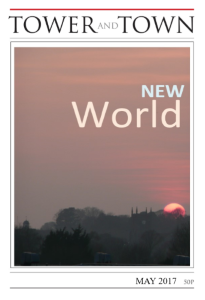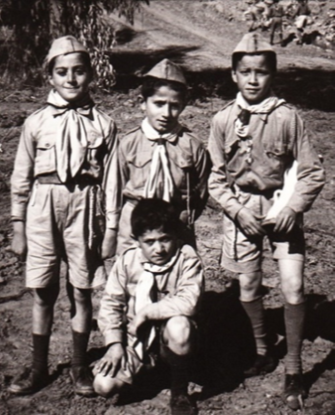

Tower and Town, May 2017 (view the full edition) (view the full edition)The Passion Of Boy Scout Mazen"My God, my God, why hast Thou forsaken me?" (see article on page 13) There is a place for forests in western history and folklore as silent witnesses to events and tales. Further east, the forest of predominantly eucalyptus occupies an area between the ruins of ancient Nineveh and the river Tigris in northern Mesopotamia, (Mosul, Iraq). This forest has once witnessed echoes of resonating calls of happy young boys during a spring day in 1960. In addition, the Mosul's forest has most recently, in December 2016, relayed the sounds of war as the Iraqi army and allies swept across the east bank of the Tigris to drive out the Jihadists of the Islamic State. 
We now have to go back in time in order to note that the resonating voices of fifty six years ago were those of the boy scouts of the Al-Tahira, (Arabic for The Immaculate), Syrian Catholic primary school for boys. They were on this specific day setting up their camp within the forest when the air was dry and warm and the earth already parched and dusty. Here a particular congenial boy called Mazen was experiencing wonderful time with his school friend Raik; and he was proud of wearing the khaki scout's uniform and the matching "Sidara" hat. The camp setting also boosted his satisfaction by complementing his achievement as member of the team responsible for the Thursday school assemblies of Rafa Al-Alam, (Arabic for Raising of the Flag). And as the sunlight met the morning dew on this spring day of 1960 Mazen, dressed in his scout's outfit, rushed to school. There the boy scouts filed in twos and marched south past Bab Al-Nabi, (Arabic for Prophet's Gate), then east along Nineveh Street towards the metal bridge, called Jisr Al-Ateek (Arabic for Old Bridge), which was erected by the British some thirty years earlier. Mazen was marching beside his friend Raik past the building of Al-Baladiya, (Arabic for Local Council), before crossing to the east bank of the Tigris. But as the platoon approached the bridge Mazen was oblivious to the many traditionally dressed Arab onlookers in the vicinity of the busy and noisy area of Bab Al-Jisr, (Arabic for Bridge Gate). Mazen was then preoccupied by discussing some intricacies of the scout's whistle. As you read these words the route of the scouts' platoon through west Mosul lies in ruins as it was the front line against the Islamists in March 2017. It should be also pointed out that the Christian communities of Iraq have existed since the early centuries of Christianity. In addition, some of their surviving monasteries date back to the 6th century AD, long before the emergence of Islam in Arabia. However, they have been under the yoke of Islam and the Ottoman caliphate for many centuries. The November 1914 Ottoman call for Jihad was instrumental in the well documented 1915 genocides of the Christians of Armenia and northern Mesopotamia, (Iraq). One century later, sustained attacks on churches, plus murders, kidnaps and threats by jihadists and collaborators are driving the remaining Iraqi Christians away from their homeland. Moreover it is anticipated that the region is set to continue harbouring ideologically radical forms of Islam for the foreseeable future. Let us pause in life's pleasures and count its many tears,From Hard Times Come Again No More, by Stephen Foster (1854) Raik Jarjis |